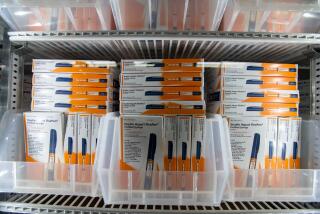Allergan Is Target of FTC Probe on Eyedrops
- Share via
Allergan Inc. said Tuesday that the Federal Trade Commission was investigating charges that the company engaged in unfair competition to prevent or stall creation of generic versions of its Acular eye drug.
The Irvine-based company, best known as the maker of the Botox anti-wrinkle treatment, received notice of the FTC’s “nonpublic investigation” May 19, according to a company filing with securities regulators Tuesday.
Allergan also received an “informal request” from FTC officials for certain documents, company spokeswoman Christine Cassiano said. She said Allergan was cooperating with the probe.
Allergan shares fell $2.07 to $76.94 on Tuesday in New York Stock Exchange trading.
For Allergan, the FTC action is the latest in a spate of regulatory run-ins. In late June, the company got its second warning in a year from the Food and Drug Administration, which ordered Allergan to immediately pull Botox advertisements that the agency said were misleading.
The FTC’s probe focuses on Acular, an anti-inflammatory eyedrop medicine introduced in 1993 and commonly used by patients suffering from swelling after operations. There is no generic version of the drug on the market. Allergan uses a compound licensed from Palo Alto-based Syntex Inc., a unit of Roche Holding, to make Acular. Syntex also distributes the treatment.
The FTC wants to know if Allergan or Syntex blocked potential generic rivals by monopolizing or attempting to monopolize the market for the eye solution.
In July 2001, Allergan and Syntex filed a patent infringement lawsuit in federal court in the Northern District of California against Toronto-based generic-drug maker Apotex Inc., which was preparing to market a generic version of Acular. Last month, Apotex sued the two companies, alleging unfair competitive practices and a conspiracy to monopolize the drug’s market.
The court’s ruling on the patent case is expected in September, and the FTC may wait for that ruling before stepping up its probe, Cassiano said.
Generic-drug makers may sell cheaper versions of brand-name medicines once patents expire or are ruled invalid. Pharmaceutical companies sometimes use tactics such as lawsuits to delay the introduction of cheaper competitors for drugs.
Since 2000, the FTC has reached a series of settlements with makers of brand-name drugs involving charges that they tried to squelch competition by delaying government approval of cheaper versions of their medicines.
*
Bloomberg News was used in compiling this report.
More to Read
Inside the business of entertainment
The Wide Shot brings you news, analysis and insights on everything from streaming wars to production — and what it all means for the future.
You may occasionally receive promotional content from the Los Angeles Times.










